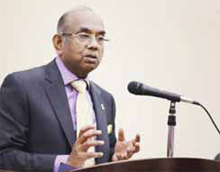KUWAIT: The College of Arts at the Kuwait University and the Embassy of India in Kuwait propose to jointly hold a ‘Kuwait-India Cultural Day’ sometime in November or December this year, bringing together the cultural legacies of the two friendly countries.
The idea of holding a cultural day evolved during a function organized at the College of Arts of the Kuwait University yesterday when the Indian embassy handed over 64 books on Indian history, art and culture to the college.
Thanking the Indian embassy and the Indian ambassador for handing over the books to the university, the Dean of the College of Arts at Kuwait University Prof Hayat Al-Hajji said: “It will be ideal if we could organize an India-Kuwait day, bringing together the cultural legacies of both countries where students can exchange cultural information and learn about the customs and traditions of each other. It can be held either in November or December this year.”
Indian Ambassador Sunil Jain, who was attending the function as the chief guest, agreed to the suggestion. “Relations between Kuwait and India are centuries-old. Our great forefathers used to travel to India in the 1930s and 1940s for trade. Now we have to cement the relations further through cultural exchanges,” Hajji said in her brief address.
“The books handed over by the embassy will be kept in the library of the history department which can be used by our students who study Indian history,” she said. Talking to Kuwait Times, she said the proposed Kuwait-India Day can also be held in February when Kuwait celebrates its National Day and Liberation Day.
“The department of history at the university is arranging a trip for students to visit historic places in India. We have very good relations and I look forward to further cementing relations with India,” Prof Hajji added.
Contemporary times
The Indian ambassador said he is profoundly proud of the institution, which has a student strength between 5,000 and 7,000. He said the books on India the embassy handed over to the college are only a token. “It was mentioned here that India-Kuwait relations are historical. The only other Taj Mahal is in Kuwait. There are several cultural similarities among the peoples. But what we are doing now is to bring the two countries closer in contemporary times. This can be done by knowing each other politically, knowing how Kuwait and India are developing and in which direction our relationships are progressing,” Jain said.
Jain said India is the largest democracy in the world and the fastest growing economy in the world, growing at a rate of 7.3 percent. Similarly, it is also an IT superpower, he said. “So, what we would like to do through the university is to talk about contemporary India. We would like all of you to visit India as often as possible to know the historical places of India and develop academic exchanges between our institutions such as Delhi University, Jawaharlal Nehru University or any other Indian university. You can decide how you want to take the academic collaboration forward,” he said. He said the embassy can also help bring books on India for the university.
Five-year visa
The Indian embassy in Kuwait has been issuing five-year multiple business visas to Kuwaiti nationals. The embassy is also offering many facilities for Kuwaitis to visit India as tourists. Recalling the visit of HH the Prime Minister Sheikh Jaber Mubarak Al-Hamad Al- Sabah to India in 2013, the ambassador said during the visit, the premier had handed over a collection of books on Kuwait to Maulana Azad University.
“As the two countries come closer, we understand each other better as friends, partners and as two peoples who have worked historically together. Let us know each other in contemporary times,” he concluded. Prof Hajji honored the Indian ambassador by presenting him a memento. From the Indian embassy, Sushil Kumar, Second Secretary (Political, Economic & Commercial Representative, A K Srivastava, Second Secretary (Information, Press and Culture) and Abdulla Kollorath, Social Secretary were also present during the function.
By Sajeev K Peter


